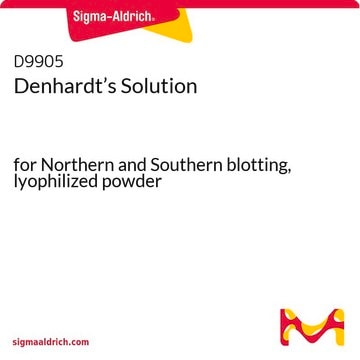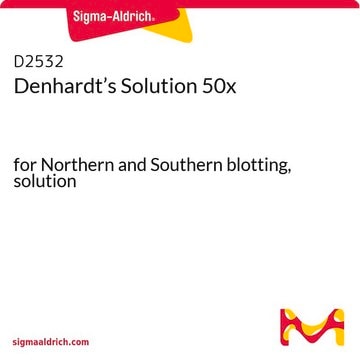GERPK0325
Microarray Hybridisation Buffer Version 2
Cytiva RPK0325, pack of 1 ea
Autenticatiper visualizzare i prezzi riservati alla tua organizzazione & contrattuali
About This Item
Codice UNSPSC:
41116006
NACRES:
NA.25
Prodotti consigliati
Confezionamento
pack of 1 ea
Produttore/marchio commerciale
Cytiva RPK0325
Condizioni di spedizione
dry ice
Temperatura di conservazione
−20°C
Descrizione generale
DNA microarrays can be used to measure the expression levels of large numbers of genes simultaneously (gene expression profiling), or to genotype multiple areas of a genome (SNP arrays), with variable coverage or resolution depending how many DNA “spots” cover those areas.
A DNA microarray (or DNA chip) is a collection of microscopic DNA spots arranged in an array and attached to a solid surface, usually a microscope slide. Each DNA spot contains a specific DNA sequence, known as a probe, or hybridization probe. These can be short sections of a gene or other DNA elements and are often used to hybridize a cDNA sample (called the target) under high-stringency conditions. This is where it is useful to have a standardized, proprietary nucleic acid hybridization solution, to get as high as possible a signal to noise ratio for genes which are less highly expressed and allowing this expression to be semi-quantified.
Probe-target hybridization is usually detected and quantified by detection of fluorophore- or chemiluminescence-labeled targets to determine relative abundance of nucleic acid sequences in the target.
When looking at gene structure (e.g. copy number) the hybridization is with DNA rather than cDNA, and the technique is known as array CGH, which is used in looking at copy numbers of genes involved in different cancers, and in looking at genetic diseases.
A DNA microarray (or DNA chip) is a collection of microscopic DNA spots arranged in an array and attached to a solid surface, usually a microscope slide. Each DNA spot contains a specific DNA sequence, known as a probe, or hybridization probe. These can be short sections of a gene or other DNA elements and are often used to hybridize a cDNA sample (called the target) under high-stringency conditions. This is where it is useful to have a standardized, proprietary nucleic acid hybridization solution, to get as high as possible a signal to noise ratio for genes which are less highly expressed and allowing this expression to be semi-quantified.
Probe-target hybridization is usually detected and quantified by detection of fluorophore- or chemiluminescence-labeled targets to determine relative abundance of nucleic acid sequences in the target.
When looking at gene structure (e.g. copy number) the hybridization is with DNA rather than cDNA, and the technique is known as array CGH, which is used in looking at copy numbers of genes involved in different cancers, and in looking at genetic diseases.
Caratteristiche e vantaggi
- Includes a blend of proprietary components to provide highly reproducible, high-quality automated and manual DNA microarray hybridizations
- Hybridization rate enhancers improve the detection of rare targets
- Proprietary blocking agents minimize non-specific background
Stoccaggio e stabilità
Please be aware this product may be shipped 90 days before the expiration date. For more information on the batch specific expiration date, please contact technical service.
Risultati analitici
To view the Certificate of Analysis for this product, please visit www.cytiva.com.
Codice della classe di stoccaggio
12 - Non Combustible Liquids
Scegli una delle versioni più recenti:
Certificati d'analisi (COA)
Lot/Batch Number
It looks like we've run into a problem, but you can still download Certificates of Analysis from our Documenti section.
Se ti serve aiuto, non esitare a contattarci Servizio Clienti
Possiedi già questo prodotto?
I documenti relativi ai prodotti acquistati recentemente sono disponibili nell’Archivio dei documenti.
Il team dei nostri ricercatori vanta grande esperienza in tutte le aree della ricerca quali Life Science, scienza dei materiali, sintesi chimica, cromatografia, discipline analitiche, ecc..
Contatta l'Assistenza Tecnica.







